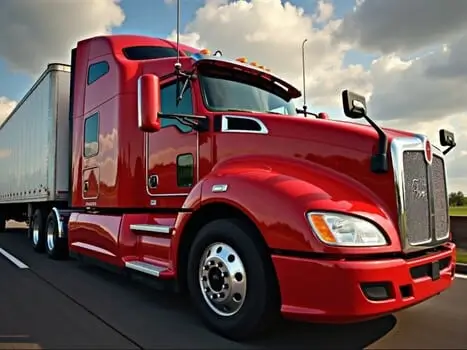
October 10, 2023

5410 Views

6 min read

January 23, 2024

5077 Views

7 min read
The trucking industry relies heavily on more than just its trucks and drivers. Behind the scenes, a range of administrative services and processes are essential for the success of each delivery. While drivers handle the physical transportation, their efforts are supported by these crucial systems.
A key component in this structure is the truck dispatcher. As the main contact point for drivers, dispatchers play a pivotal role in coordinating logistics and providing support during trips. Their effectiveness directly impacts the efficiency of the trucking operations. To ensure successful outcomes, dispatchers need to be well-trained and competent. This article will provide practical tips on becoming the best truck dispatchers to improve their skills and contribute significantly to the smooth operation of trucking activities.
To become a professional truck dispatcher, one must first grasp the essential responsibilities of the role. The primary task involves coordinating the pickup and delivery of goods, requiring efficient management of transportation routes. A dispatcher must schedule truck drivers effectively, ensuring that each shipment is delivered on time and within budget constraints. This role demands a keen eye for logistics and an ability to adapt to varying transportation scenarios.
In addition to the responsibilities of managing logistics, a truck dispatcher also liaises with stakeholders, including drivers, customers, and other logistical partners, to facilitate smooth operations. They must be able to promptly address and resolve any issues during transit, which is crucial.

A degree or certification education isn’t always needed to become a truck dispatcher, but certain programs can be advantageous. For instance, relevant supply chain management, transportation, or logistics programs provide targeted skills applicable to dispatching. While these educational pathways offer foundational knowledge, real-world experience in the field is equally important. Direct experience equips you with practical skills and a better understanding of the dispatcher’s role.
Getting an education or gaining field experience is a strategic approach to entering the dispatch profession. Each path, through academic learning or hands-on work, contributes significantly to developing the necessary skills. It’s important to recognize that any form of training or education in this area is valuable, as it prepares you for the demands and challenges of a career in truck dispatching.

Effective communication is essential for dispatchers, as they need to relay information clearly to drivers and clients. Building strong communication skills is crucial to minimize misunderstandings and errors, especially in an industry where mistakes can be costly. Clear communication enhances efficiency and reduces potential issues.
Additionally, for those running their own business, good communication skills are key to maintaining a positive reputation and building professional relationships. These skills improve job performance and significantly affect long-term career success.
Truck dispatching has evolved from minimally dependent on technology to heavily relying on it. Modern software is transforming logistics management, enabling better planning and business methods. For instance, trucking dispatchers now use Computer-Aided Dispatch Systems (CAD) for efficient information management and improved communication, facilitated by new GPS technology, which reduces the need to contact truckers for their locations.
Previously, truck dispatchers handled many repetitive tasks manually. Today, automated systems and dispatch management software have taken over many of these roles. In addition, keeping up with the latest dispatching technology is essential, especially for business owners. These technologies offer competitive advantages and streamline job functions.
A key aspect of a dispatcher’s role is predicting market trends. Building industry knowledge enables them to negotiate rates effectively, ensuring trucks are consistently loaded with profitable freight, maximizing revenue and the rate per mile. This approach involves more than just accepting the first suitable shipment; it includes recognizing and capitalizing on situations of high demand where their truck might be the only one available, allowing for higher rates.
Dispatchers must also be adept in negotiations, particularly with brokers who aim to minimize costs to maximize profit margins. A dispatcher’s ability to negotiate confidently is crucial for securing freight at favorable rates.

Time management is crucial for truck drivers, directly affecting their income. Drivers are often paid by load, mile, or hour, and their earnings are linked to their driving time. Truck dispatchers play a key role in this process. They plan and execute deliveries, manage drivers’ and vehicles’ time, and aim for timely, cost-effective deliveries. Effective time management by dispatchers can decrease drivers’ time on the road, improving delivery efficiency and resource utilization.
Time management and prioritization are vital in reducing operational costs and increasing profitability. Strategies like load optimization, scheduling, and routing reduce idle time for drivers, especially in traffic, impacting the company’s bottom line. Ensuring customer satisfaction is also crucial. Timely and safe delivery of goods is necessary to meet customer expectations. Proper time management helps avoid late deliveries, leading to customer satisfaction.
Problem-solving skills are crucial for truck dispatchers, who must address unexpected challenges like route alterations, traffic delays, and vehicle breakdowns. Effective problem-solving requires quick, logical decision-making and thinking on one’s feet. Dispatchers must understand logistics deeply, assess situations swiftly, and develop contingency plans. They should remain calm under pressure, which aids in clear thinking and better decision-making.
Additionally, learning from past incidents is vital. Analyzing previous problems helps prevent future issues. Engaging with colleagues and drivers from different perspectives can also lead to innovative solutions.
Building relationships is crucial for trucking dispatchers, playing a significant role in career advancement. Regular interactions with a variety of individuals can open opportunities for professional growth. Effective communication skills are particularly important. Building relationships can be a powerful tool for those aiming to start or grow their business to expedite the process and expand the client base. A positive professional impression on key contacts can lead to referrals and enhanced business opportunities.
Effective stress management is essential for truck dispatchers, who often face high-pressure situations daily. Key strategies include recognizing early signs of stress like frustration or anxiety and actively addressing them with practical techniques such as deep breathing, taking short breaks, or engaging in physical activity. Organizing the workspace and planning the day can also help manage the workload and reduce feeling overwhelmed.
Additionally, developing a resilient mindset helps in handling challenging situations positively. Building a support network with colleagues for sharing experiences and solutions is useful in mitigating stress. It’s also important to balance work with personal life.

In truck dispatching, continuous improvement is essential for keeping pace with evolving industry standards and technologies. Dispatchers must regularly update their knowledge through training programs, industry seminars, or formal education. This commitment to lifelong learning helps adapt to new methods and improve efficiency. It’s also important for dispatchers to routinely evaluate their performance, incorporating feedback from drivers, colleagues, and clients to identify areas needing enhancement.
As you embark on becoming a successful trucking dispatcher, it’s essential to focus on honing your skills and applying the knowledge you’ve acquired. By diligently implementing the tips shared, you are setting yourself up for a promising career in truck dispatching. This proactive approach will fast-track your professional growth and establish you as a competent and efficient dispatcher in the highly dynamic trucking industry.
Test